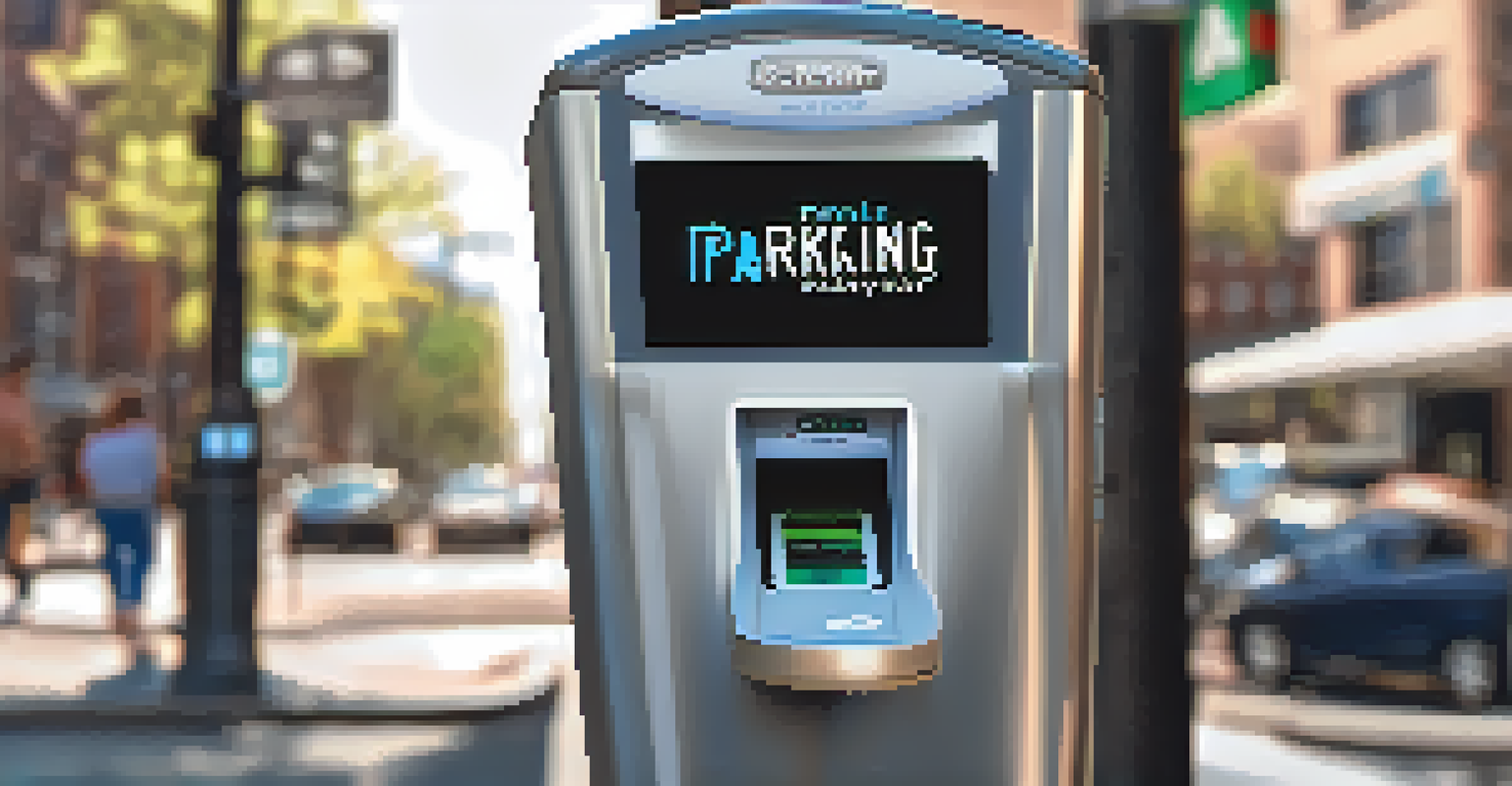Integrating Cryptocurrencies in Smart City Payment Systems

Understanding Cryptocurrencies and Their Role
Cryptocurrencies, like Bitcoin and Ethereum, are digital currencies that use blockchain technology for secure transactions. They operate independently of traditional banks, which can make them appealing for various applications, including in smart cities. By integrating these currencies, cities can streamline payment systems and increase transaction efficiency.
Bitcoin is a technological tour de force.
Imagine a city where you can pay for public transportation, parking, and even utility bills using your smartphone wallet filled with cryptocurrency. This not only simplifies the payment process but also provides users with greater control over their finances. As we delve deeper into this topic, you'll see how this innovation can transform everyday transactions.
Moreover, cryptocurrencies can foster transparency in financial dealings, as every transaction is recorded on a public ledger. This can help combat fraud and corruption, which are persistent issues in urban governance, making cities smarter and more accountable.
Benefits of Cryptocurrency in Smart City Payments
One of the most significant advantages of using cryptocurrencies in smart city payment systems is lower transaction fees. Traditional payment methods often incur hefty charges, especially for international transactions. In contrast, cryptocurrencies can offer reduced costs, making them attractive for both consumers and city budgets.

Additionally, the speed of transactions cannot be overlooked. With cryptocurrencies, payments can be processed in real-time, eliminating delays often associated with traditional banking systems. This immediacy can enhance user experience significantly, especially in sectors like public transport where time is of the essence.
Cryptocurrencies Enhance City Payments
Integrating cryptocurrencies can streamline payment systems in smart cities, offering lower fees and real-time transaction processing.
Finally, cryptocurrencies can promote financial inclusion. Many people remain unbanked or underbanked, especially in urban areas. By enabling payments through cryptocurrency, cities can empower these individuals, allowing them to participate more fully in the economy.
Challenges of Integrating Cryptocurrencies
Despite the benefits, integrating cryptocurrencies into smart city payment systems isn't without challenges. One major hurdle is regulatory uncertainty, as governments and financial institutions grapple with how to classify and regulate digital currencies. This can create hesitation for cities considering the adoption of cryptocurrencies.
Blockchain is the tech. Bitcoin is merely the first mainstream manifestation of its potential.
Moreover, the volatility of cryptocurrency values poses a significant risk. Prices can swing dramatically, which could affect city revenues if not managed properly. Cities need to have strategies in place to mitigate this risk, ensuring financial stability in their payment systems.
Lastly, public education is crucial. Many residents may not be familiar with how cryptocurrencies work, leading to skepticism or reluctance to adopt new payment methods. Cities must invest in outreach and education initiatives to build trust and understanding among citizens.
Successful Examples of Cryptocurrency Integration
Several cities around the globe are already taking strides in integrating cryptocurrencies into their payment systems. For instance, in Miami, residents can pay their city fees using Bitcoin, showcasing a forward-thinking approach to modern finance. This pilot program has not only increased convenience for citizens but also attracted tech-savvy individuals to the city.
Similarly, the city of Lugano in Switzerland has embraced cryptocurrencies by allowing residents to pay taxes and tuition fees with digital currencies. This innovative move has positioned Lugano as a hub for cryptocurrency adoption, highlighting the potential benefits for local economies.
Blockchain Ensures Transaction Security
Blockchain technology underpins cryptocurrencies, providing a secure and transparent method for recording transactions in urban environments.
These examples illustrate that integrating cryptocurrencies is not just a theoretical concept but a tangible reality. As more cities experiment with these systems, they provide valuable lessons and insights for others to follow.
The Role of Blockchain Technology
Blockchain technology is the backbone of cryptocurrencies, ensuring secure and transparent transactions. In the context of smart city payment systems, blockchain can facilitate a decentralized ledger that records every transaction, making it nearly impossible to alter data without consensus. This level of security is vital for building trust among users.
Moreover, blockchain can enhance efficiency by automating processes through smart contracts. These self-executing contracts can automatically trigger payments when certain conditions are met, streamlining operations in public services and reducing the need for intermediaries.
As cities explore the integration of cryptocurrencies, understanding blockchain's role is essential. It not only supports the currency but also revolutionizes how transactions can be conducted, paving the way for a more efficient urban ecosystem.
Future Trends in Smart City Payments
As technology evolves, so do payment systems. The future of smart city payments is likely to see a greater fusion of cryptocurrencies with the Internet of Things (IoT). Imagine smart parking meters that automatically deduct fees using cryptocurrency from your digital wallet, all without any manual intervention.
Additionally, the rise of Central Bank Digital Currencies (CBDCs) may further influence the landscape. These digital currencies, issued by central banks, could coexist with cryptocurrencies, offering a regulated alternative while still embracing the digital trend.
Challenges in Cryptocurrency Adoption
Despite the benefits, cities face hurdles such as regulatory uncertainty and the need for public education on cryptocurrencies.
Ultimately, the integration of cryptocurrencies in smart city payment systems will continue to evolve. Staying ahead of these trends will be essential for cities looking to enhance their payment infrastructures and improve citizen engagement.
Conclusion: Embracing the Future of Payments
Integrating cryptocurrencies into smart city payment systems presents an exciting opportunity for urban landscapes. While challenges exist, the potential benefits such as lower costs, increased efficiency, and enhanced transparency are compelling reasons for cities to explore this avenue. As we've seen from successful examples, adoption can lead to transformative changes.
Moreover, the role of blockchain technology cannot be understated, backing the secure transactions that cryptocurrencies offer. As cities look to the future, they must remain adaptable, keeping pace with technological advancements and evolving citizen needs.

In conclusion, embracing cryptocurrencies in smart city payments is not just about keeping up with trends; it's about creating a smarter, more efficient urban experience for all. The journey may be challenging, but the rewards could be monumental.